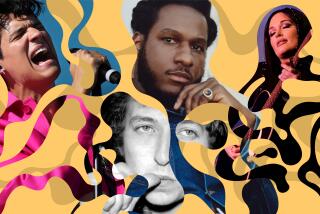Theyâre back in black
Odds are that the words âOh baby Draculaâ had never been sung, or for that matter spoken, on the tennis court at the Home Depot Center in Carson before Friday. But those words were sung by Scarling frontwoman Jessicka -- under the bright sun, in fact.
Even at this hour there were plenty of baby Draculae on hand -- and many senior Draculae as well. Los Angeles band Scarling was the first act performing on the Curiosa Festival, an ambitious event spearheaded and headlined by the Cure, whose leader, Robert Smith, has been rockâs reigning Gothfather for more than 20 years.
Smith, sounding reinvigorated on âThe Cure,â the bandâs new album, handpicked the seven other acts on the bill, bands that if not directly inspired by the Cure, in most cases share a clear love for music from the early-â80s post-punk era that spawned the headliner.
With the acts alternating between the main stage in the big soccer stadium and the small stage in the adjacent tennis court, the grounds were teeming with fans who have affected variations on Smithâs look of ratter black hair, black mascara, black (or red) lipstick and heavy black clothing.
That the Scarling song was actually a reflection (pun intended) on that phenomenon, calling for Goth fans to break out of the mold, may not have been lost on the Goths themselves. But then it may have been, since Jessicka and her bandmates were themselves swathed in solid black.
And when the Cure opened its set four hours later with the new song âLost,â the irony hung like the now-risen, near-full moon as Smith capped off the songâs moaning mantra of âI canât find myselfâ by concluding, âI got lost in someone elseâ -- to a crowd dotted with people so clearly lost in trying to emulate him.
But then, thatâs always been the irony of Goth (or punk, or metal, or hip-hop, or insert-any-pop-subculture-phenomenon-here): Itâs all about young people trying to find their own identity, establish their own sense of self, by getting together and dressing alike.
Smith did little else in the Cureâs generous set to challenge his fans, but plenty to embrace and elate them. Drawing from the bandâs entire catalog, the Cure draped its languid sounds around Smithâs lugubrious voice as smoothly as ever, at a few stretches showing more of the pep and edge of the bandâs early days than it had in more recent tours.
A set of three of the most familiar hits (âLovesong,â âIn Between Daysâ and âJust Like Heavenâ) early in the show sounded nearly snappy. And Smith himself had a little bounce to his step as he expounded on what is really the thematic core of the Cureâs catalog, and perhaps the whole Goth culture -- the ultimate human fantasy of just being loved, passionately and unconditionally, for who you are.
The chance for fans to stretch (physically and musically) came via sauntering back and forth between the stages to sample some up-and-comer acts, most of which, like the Cure, played at Aprilâs Coachella Valley Music and Arts Festival.
The main stageâs second-billed band, Interpol, was the only entry other than the Cure that looked and sounded like it belonged in such a large setting, the New York quartet showing strong swagger and confidence in its performance, even if the music (influenced more by the Joy Division/Bauhaus wing of Goth) became monotonous.
After Scarlingâs second stage set, the main stage kicked off with the massive guitar waves of Scotlandâs Mogwai, which seemed to connect with many fans despite the instrumental nature of the music and the inappropriate daylight for the mood.
Head Automatica, next on the second stage, is a side-project of Daryl Palumbo, singer for the hard-rocking band Glassjaw, and seemed too much a side project here, following a few hero-worship whims (Billy Idol, David Bowie, Elvis Costello) with a Hives-like sense of grooming.
Missing, and missed, was the sonic presence of producer and turntable artist Dan (the Automator) Nakamura, Palumboâs collaborator on the bandâs recent debut album.
New York band the Raptureâs jagged, Gang of Four-inspired post-punk brought edginess to the main stage, the most interesting pieces being those in which Gabriel Andruzziâs saxophone added distinct textures. Englandâs Cooper Temple Clause was gripping on the small stage for two songs, finding the common ground between Nirvana, Oasis and Prodigy -- but then lost its momentum and magnetism for the rest of the set. Omahaâs Cursive closed the small stage with a nicely shabby but less-than-compelling program.
More to Read
The biggest entertainment stories
Get our big stories about Hollywood, film, television, music, arts, culture and more right in your inbox as soon as they publish.
You may occasionally receive promotional content from the Los Angeles Times.










